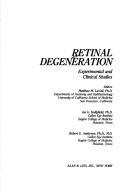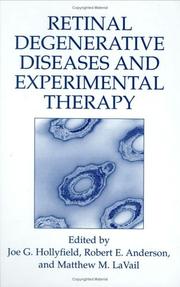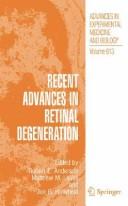| Listing 1 - 10 of 17 | << page >> |
Sort by
|

ISBN: 0845142003 Year: 1985 Publisher: New York (N.Y.) : Liss,
Abstract | Keywords | Export | Availability | Bookmark
 Loading...
Loading...Choose an application
- Reference Manager
- EndNote
- RefWorks (Direct export to RefWorks)
Book
ISBN: 1461406307 1461406315 9786613441218 1283441217 Year: 2012 Publisher: New York : Springer,
Abstract | Keywords | Export | Availability | Bookmark
 Loading...
Loading...Choose an application
- Reference Manager
- EndNote
- RefWorks (Direct export to RefWorks)
This book will contain the proceedings of the XIV International Symposium on Retinal Degeneration (RD2010), held July 13-17, 2010, in Mont-Tremblant, Quebec, Canada. The volume will present representative state-of-the-art research in almost all areas of retinal degenerations, ranging from cytopathologic, physiologic, diagnostic and clinical aspects; animal models; mechanisms of cell death; candidate genes, cloning, mapping and other aspects of molecular genetics; and developing potential therapeutic measures such as gene therapy and neuroprotective agents for potential pharmaceutical therapy.
Retinal degeneration -- Congresses. --- Retinal degeneration. --- Retinal degeneration --- Publication Formats --- Retinal Diseases --- Publication Characteristics --- Eye Diseases --- Diseases --- Congresses --- Retinal Degeneration --- Medicine --- Biology --- Health & Biological Sciences --- Microbiology & Immunology --- Ophthalmology & Optometry --- Degeneration, Retinal --- Degenerations, Retinal --- Retinal Degenerations --- Disease, Eye --- Diseases, Eye --- Eye Disease --- Disease, Retinal --- Diseases, Retinal --- Retinal Disease --- Dystrophy, Retinal --- Macular degeneration --- Retina --- Retinal dystrophy --- Degeneration --- Medicine. --- Gene therapy. --- Immunology. --- Geriatrics. --- Ophthalmology. --- Biomedicine. --- Geriatrics/Gerontology. --- Gene Therapy. --- Eye --- Gerontology --- Older people --- Immunobiology --- Life sciences --- Serology --- Therapy, Gene --- Genetic engineering --- Therapeutics --- Clinical sciences --- Medical profession --- Human biology --- Medical sciences --- Pathology --- Physicians --- Health and hygiene

ISBN: 0306461935 0585331723 Year: 1999 Publisher: New York, New York : Kluwer Academic Publishers,
Abstract | Keywords | Export | Availability | Bookmark
 Loading...
Loading...Choose an application
- Reference Manager
- EndNote
- RefWorks (Direct export to RefWorks)
To create a forum for scientists and clinicians interested in degenerative retinal diseases, we began in 1984 to organize a biennial symposium on Retinal Degeneration as a satellite meeting of the International Congress of Eye Research. The timing and varying location of these meetings provides an important assembly for investigators from throughout the world to convene for presentation of their new findings on the causes and potential therapies for degenerative retinal disorders. The VIII International Symposium on Retinal Degeneration was held from July 28-25, 1998, at the Hotel Vier Jahreszeiten in Schluchsee, a small town in the Black Forest of southwestern Germany. Most of the participants in this meeting contributed to this volume, and we are appreciative of the efforts of each author in making this publication possible. The research presented at the meeting, and described in this proceedings volume, reflects a strong emphasis on the molecular genetic approach to understa- ing these disorders. Several of the papers provide important new insights into the mechanism of photoreceptor degeneration and cell death. A number of the studies are targeted at retarding or reversing the degeneration process. Included for the first time are presentations from all the principal laboratories involved in the field of visual prostheses-implant (chip) technology-in which investigations are targeted at restoring vision in eyes that have lost photoreceptor cells. A variety of diagnostic, clinical, histopathological, and physiological assessments of retinal degeneration in patients are also included.
Photoreceptors --- Retina --- Retinal Degeneration --- Retinal Degenetation --- Degeneration --- Treatment --- genetics --- physiopathology --- therapy --- Photoreceptors -- Congresses. --- Retinal degeneration -- Congresses. --- Retinal degeneration -- Treatment -- Congresses. --- Retinal Neurons --- Neurons, Afferent --- Photoreceptor Cells --- Retinal degeneration --- Medicine. --- Human genetics. --- Pharmacology. --- Human anatomy. --- Ophthalmology. --- Biomedical engineering. --- Medicine & Public Health. --- Human Genetics. --- Biomedical Engineering. --- Anatomy. --- Pharmacology/Toxicology. --- Toxicology. --- Biomedical Engineering and Bioengineering. --- Genetics --- Physiopathology --- Therapy --- Drug effects --- Medical pharmacology --- Medical sciences --- Chemicals --- Chemotherapy --- Drugs --- Pharmacy --- Anatomy, Human --- Anatomy --- Human biology --- Human body --- Clinical engineering --- Medical engineering --- Bioengineering --- Biophysics --- Engineering --- Medicine --- Heredity, Human --- Physical anthropology --- Eye --- Physiological effect --- Diseases --- Dystrophy, Retinal --- Macular degeneration --- Retinal dystrophy --- Degeneration (Pathology)

ISBN: 0306457016 Year: 1997 Publisher: New York (N.Y.) : Plenum press,
Abstract | Keywords | Export | Availability | Bookmark
 Loading...
Loading...Choose an application
- Reference Manager
- EndNote
- RefWorks (Direct export to RefWorks)
Retina --- Retinal Degeneration --- Degeneration --- Congresses. --- Genetics --- Physiopathology

ISBN: 0845151649 Year: 1989 Publisher: New York Liss
Abstract | Keywords | Export | Availability | Bookmark
 Loading...
Loading...Choose an application
- Reference Manager
- EndNote
- RefWorks (Direct export to RefWorks)

ISBN: 1280969709 9786610969708 0387324429 0387284648 1489997725 Year: 2006 Publisher: New York, NY : Springer,
Abstract | Keywords | Export | Availability | Bookmark
 Loading...
Loading...Choose an application
- Reference Manager
- EndNote
- RefWorks (Direct export to RefWorks)
Retinal Degenerations is the result of the International Symposium on Retinal degeneration which has become perhaps the most important research meeting in the field. THe topics in this volume explore the etiology, cellular mechanisms, epidemiology, genetics, models and potential therapeutic measures for the blinding diseases of retinitis pigmentosa and age-related macular degeneration.
Retinal degeneration --- Dystrophy, Retinal --- Macular degeneration --- Retina --- Retinal dystrophy --- Degeneration (Pathology) --- Degeneration --- Diseases --- Human anatomy. --- Ophthalmology. --- Quality of Life --- Epidemiology. --- Life sciences. --- Anatomy. --- Quality of Life Research. --- Life Sciences, general. --- Research. --- Medicine --- Eye --- Life, Quality of --- Economic history --- Human ecology --- Life --- Social history --- Basic needs --- Human comfort --- Social accounting --- Work-life balance --- Anatomy, Human --- Anatomy --- Human biology --- Medical sciences --- Human body --- Biosciences --- Sciences, Life --- Science --- Public health --- Medical research. --- Biomedical research --- Medical research

ISBN: 1281137774 9786611137779 0387749047 0387749020 1441925775 Year: 2008 Publisher: New York, N.Y. : Springer,
Abstract | Keywords | Export | Availability | Bookmark
 Loading...
Loading...Choose an application
- Reference Manager
- EndNote
- RefWorks (Direct export to RefWorks)
Retinal Degenerations is the result of The International Symposium on Retinal Degeneration which has become perhaps the most important research meeting in the field. The topics in this volume explore the etiology, cellular mechanisms, epidemiology, generics, models and potential therapeutic measures for the blinding diseases of retinitis pigmentosa and age-related macular degeneration. Special focus is highlighted in the areas of Mechanisms of Photoreceptor Degeneration and Cell Death (extremely important because very little is known how or why photoreceptors die in these diseases, despite an abundance of genetic information), Age-Related Macular Degeneration (with several novel approaches to its analysis), Usher Syndrome (the most severe form of retinitis pigmentosa, which includes an early of congenital loss of hearing along with blindness), and Gene Therapy. In addition, the section on Basic Science Related to Retinal Degeneration is particularly strong with several laboratories reporting on new discoveries in the area of outer segment phagocytosis, a key component of photoreceptor-retinal pigment epithelial cell interactions in normal and degenerating retinas.
Retinal degeneration --- Dystrophy, Retinal --- Macular degeneration --- Retina --- Retinal dystrophy --- Degeneration (Pathology) --- Degeneration --- Diseases --- Ophthalmology. --- Medicine --- Eye
Book
ISBN: 144191398X 1441913998 1282831550 Year: 2010 Publisher: New York ; London : Springer,
Abstract | Keywords | Export | Availability | Bookmark
 Loading...
Loading...Choose an application
- Reference Manager
- EndNote
- RefWorks (Direct export to RefWorks)
This is the proceedings of the XIIIth International Symposium on Retinal Degenerations, which will be held in Emeishan, Sichuan, China on September 18 - 23, 2008. The themes will include ""Molecular and genetic mechanisms in photoreceptor degeneration,"" ""Age-related macular degeneration,"" ""New diagnostic techniques for retinal degenerations."" ""Neuroprotection in the prevention of retinal degeneration,"" ""Gene therapy and the correction of gene defects,"" as well as other emerging topics that may develop over the next few months.
Retinal degeneration -- Congresses. --- Retinal degeneration. --- Retinal Degeneration --- Retinal Diseases --- Eye Diseases --- Diseases --- Ophthalmology & Optometry --- Medicine --- Health & Biological Sciences --- Retinal degeneration --- Diagnosis --- Dystrophy, Retinal --- Macular degeneration --- Retina --- Retinal dystrophy --- Degeneration --- Medicine. --- Ophthalmology. --- Medicine & Public Health. --- Eye --- Clinical sciences --- Medical profession --- Human biology --- Life sciences --- Medical sciences --- Pathology --- Physicians --- Degeneration (Pathology)
Book

ISBN: 3319171208 3319171216 Year: 2016 Publisher: Cham : Springer International Publishing : Imprint: Springer,
Abstract | Keywords | Export | Availability | Bookmark
 Loading...
Loading...Choose an application
- Reference Manager
- EndNote
- RefWorks (Direct export to RefWorks)
Contains the proceedings of the XVI International Symposium on Retinal Degeneration (RD2014), held July 13-18, 2014 at the Asilomar Conference Center in Pacific Grove, California. A majority of those who spoke and presented posters at the meeting contributed to this volume. The Symposium addressed the blinding diseases of inherited retinal degenerations, which have no effective treatments, and age-related macular degeneration, which has no cures, despite the fact that it is an epidemic among the elderly, with 1 in 3-4 affected by the age of 75. The RD2014 Symposium focused on the exciting new developments aimed at understanding these diseases and providing therapies for them. The volume presents representative state-of-the-art research in almost all areas of retinal degenerations, ranging from cytopathologic, physiologic, diagnostic and clinical aspects; animal models; mechanisms of cell death; molecular genetics; and developing potential therapeutic measures such as gene therapy and neuroprotective agents for potential pharmaceutical therapy; and several sight restoration approaches, including optogenetics. While advances in these areas of retinal degenerations are included, several new topics either were in their infancy or did not exist at the time of the last RD Symposium, RD2012. These include many new developments in sight restoration using optogenetics, retinal or RPE cell transplantation, stem cell approaches and visual prosthetic devices. In addition, major advances are presented in other basic mechanisms in age-related macular degeneration, several new aspects of gene and antioxidant therapy, and revolutionary new imaging and functional testing that will have a huge impact on the diagnosis and following the course of retinal degenerations, as well as to provide new quantitative endpoints for clinical trials. The retina is an approachable part of the central nervous system (CNS), and there is a major interest in neuroprotective and gene therapy for CNS diseases and neurodegenerations, in general. It should be noted that with successful and exciting initial clinical trials in neuroprotective and gene therapy, including the restoration of sight in blind children, the retinal degeneration therapies are leading the way towards new therapeutic measures for neurodegenerations of the CNS. Many of the successes recently reported in these areas of retinal degeneration sprang from collaborations established at previous RD Symposia, and many of those are reported at the RD2014 meeting and included in this volume.
Ophthalmology & Optometry --- Medicine --- Health & Biological Sciences --- Retinal degeneration. --- Dystrophy, Retinal --- Macular degeneration --- Retina --- Retinal dystrophy --- Degeneration --- Degeneration (Pathology) --- Diseases --- Ophthalmology. --- Neurosciences. --- Immunology. --- Immunobiology --- Life sciences --- Serology --- Neural sciences --- Neurological sciences --- Neuroscience --- Medical sciences --- Nervous system --- Eye

ISBN: 9780387749020 9780387749044 Year: 2008 Publisher: New York NY Springer New York
Abstract | Keywords | Export | Availability | Bookmark
 Loading...
Loading...Choose an application
- Reference Manager
- EndNote
- RefWorks (Direct export to RefWorks)
Retinal Degenerations is the result of The International Symposium on Retinal Degeneration which has become perhaps the most important research meeting in the field. The topics in this volume explore the etiology, cellular mechanisms, epidemiology, generics, models and potential therapeutic measures for the blinding diseases of retinitis pigmentosa and age-related macular degeneration. Special focus is highlighted in the areas of Mechanisms of Photoreceptor Degeneration and Cell Death (extremely important because very little is known how or why photoreceptors die in these diseases, despite an abundance of genetic information), Age-Related Macular Degeneration (with several novel approaches to its analysis), Usher Syndrome (the most severe form of retinitis pigmentosa, which includes an early of congenital loss of hearing along with blindness), and Gene Therapy. In addition, the section on Basic Science Related to Retinal Degeneration is particularly strong with several laboratories reporting on new discoveries in the area of outer segment phagocytosis, a key component of photoreceptor-retinal pigment epithelial cell interactions in normal and degenerating retinas.
| Listing 1 - 10 of 17 | << page >> |
Sort by
|

 Search
Search Feedback
Feedback About UniCat
About UniCat  Help
Help News
News